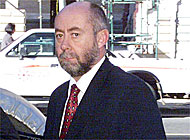Swiss investigate alleged secret service links to South Africa

The Swiss government is probing allegations that the former head of Switzerland's secret service, Peter Regli, was involved in the criminal activities of Wouter Basson, South Africa's director of a covert chemical weapons programme during the apartheid era.
The allegations were made in a court in Pretoria, South Africa, where Basson, dubbed “Dr Death” by the South African media, is on trial for murder, attempted murder and fraud.
Basson, who testified in his own defence for the first time last month in the case, which began in 1999, claimed Regli had helped him obtain 500kgs of Mandrax, an illegal drug, from Russia in 1992.
Basson’s allegations are more detailed than previous ones that Regli and a freelance agent of Switzerland’s secret service, Jürg Jacomet, had had dubious contacts with Basson, who was the head of South Africa’s secret chemical weapons programme “Coast”, well into the early 1990s.
Two years ago, a Swiss parliamentary inquiry investigated alleged collaboration between the Swiss and South African secret services when the Pretoria government pushed through a series of far-reaching reforms despite opposition from its own security apparatus.
Commission accepted explanation
But the commission leading the inquiry accepted Regli’s explanations in 1999 that his contacts were “purely of an informative nature.”
However, the four-star general was discharged in the wake of an unrelated affair and after a brief stint at putting the secret service’s archives in order – an assignment that was met with incredulity by critics and the media at the time.
Switzerland’s Ministry of Defence decided during the weekend to probe Basson’s allegations. “We assume Regli’s actions were within the law,” ministry spokesman Oswald Sigg told swissinfo. “anyone who says otherwise would need some convincing to do.”
Regli denies allegations
Regli, 56, who is now retired, told swissinfo on Wednesday that the Swiss secret service had no connection with the covert South African weapons programme while he was director.
“The Swiss intelligence service — and the director of the intelligence service — was not aware of the secret programme of South Africa, because it was secret, part one, and part two, the Swiss intelligence service had nothing to do with this intelligence service, and neither had its director.”
Regli said he stressed this during the parliamentary inquiry, when it investigated the matter in 1999. The investigative commission “came out with the result that General Regli was not involved in the matter.”
He learned of Basson’s charges through the media, Regli told swissinfo. Asked why Basson would make the accusations, Regli said Basson had known a reserve officer involved in intelligence “at a technical level” in South Africa but who had “nothing to do with the strategic intelligence where I was director.” The reserve officer has since died, Regli said.
In published interviews last week, he called Basson’s allegations “unsubstantiated slander” and a “sweeping defence by a criminal.”
As for any recent intelligence links between Switzerland and South Africa, Regli told swissinfo that “as a former director, I never express myself on intelligence subjects in public.”
Report in October
The internal probe is also attempting to establish if any documents relating to Swiss-South African intelligence cooperation might be missing. An interim report, due on October 31, will either close the affair or lead to an external and more thorough investigation “if the slightest suspicion is brought to light”, Sigg said.
Critics of the secret cooperation between Swiss and South African intelligence agents and the Swiss media welcomed the probe.
The parliamentary commission of 1999 had only “scratched the surface,” Gyan Sharan of the Swiss Campaign for Debt Relief and Reparation for Southern Africa told swissinfo. The new probe was a fresh opportunity “to take the whole spread of issues that Wouter Basson has put on the table seriously.”
Basson’s allegations carry little credibility in the South African media. The former surgeon turned chemical weapons inventor mentioned the 500kgs of Mandrax allegedly obtained with the help of Regli in his defence in a fraud charge.
Secret government funds
Giving evidence in his trial in Pretoria on July 27, Basson claimed he paid for the drugs with secret government funds assigned to his “Coast” programme but since unaccounted for. He claimed the drugs were bought for possible use in “crowd control”; however, when the plan was abandoned in 1993, the half-ton of Mandrax tablets was “dumped in the ocean” according to Basson.
But for all its more unlikely aspects, the alleged cooperation with South Africa’s chemical weapons programme has brought to light enough facts to raise suspicions about Switzerland’s secret service.
The Swiss media revealed in successive reports since the late 1990s that Basson began contacting Swiss military intelligence officers in 1988; that he visited a Swiss army test laboratory for the protection against nuclear, biological and chemical weapons in Spiez, canton Bern, on numerous occasions; and that he met Regli in 1991.
The media reports also said that Basson was arrested with freelance agent and arms dealer Jacomet in Zurich in 1993 for an attempted money-laundering offence; and that his contacts with individuals connected with the Swiss secret service carried on until 1994.
by Markus Haefliger

In compliance with the JTI standards
More: SWI swissinfo.ch certified by the Journalism Trust Initiative
You can find an overview of ongoing debates with our journalists here . Please join us!
If you want to start a conversation about a topic raised in this article or want to report factual errors, email us at english@swissinfo.ch.